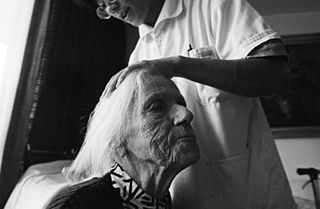Related Research Articles

Home care is supportive care provided in the home. Care may be provided by licensed healthcare professionals who provide medical treatment needs or by professional caregivers who provide daily assistance to ensure the activities of daily living (ADLs) are met. In-home medical care is often and more accurately referred to as home health care or formal care. Home health care is different non-medical care, custodial care, or private-duty care which refers to assistance and services provided by persons who are not nurses, doctors, or other licensed medical personnel. For patients recovering from surgery or illness, home care may include rehabilitative therapies. For terminally ill patients, home care may include hospice care.
Counseling psychology is a psychological specialty that began with a focus on vocational counseling, but later moved its emphasis to adjustment counseling, and then expanded to cover all normal psychology psychotherapy. There are many subcategories for counseling psychology, such as marriage and family counseling, rehabilitation counseling, clinical mental health counseling, educational counseling, etc. In each setting, they are all required to follow the same guidelines.
Couples therapy attempts to improve romantic relationships and resolve interpersonal conflicts.
An employee assistance program in the United States generally offers free and confidential assessments, short-term counseling, referrals, and follow-up services for employees. EAP counselors may also work in a consultative role with managers and supervisors to address employee and organizational challenges and needs. Many corporations, academic institution and/or government agencies are active in helping organizations prevent and cope with workplace violence, trauma, and other emergency response situations. There is a variety of support programs offered for employees. Even though EAPs are mainly aimed at work-related issues, there are a variety of programs that can assist with problems outside of the workplace. EAPs have grown in popularity over the years.
Online counseling or online therapy is a form of professional mental health counseling that is generally performed through the internet. Computer aided technologies are used by the trained professional counselors and individuals seeking counseling services to communicate rather than conventional face-to-face interactions. Online counseling is also referred to as teletherapy, e-therapy, cyber therapy, or web counseling. Services are typically offered via email, real-time chat, and video conferencing. Some clients use online counseling in conjunction with traditional psychotherapy, or nutritional counseling. An increasing number of clients are using online counseling as a replacement for office visits.
Licensed professional counselor (LPC) is a licensure for mental health professionals in some countries.
A mental health professional is a health care practitioner or social and human services provider who offers services for the purpose of improving an individual's mental health or to treat mental disorders. This broad category was developed as a name for community personnel who worked in the new community mental health agencies begun in the 1970s to assist individuals moving from state hospitals, to prevent admissions, and to provide support in homes, jobs, education, and community. These individuals were the forefront brigade to develop the community programs, which today may be referred to by names such as supported housing, psychiatric rehabilitation, supported or transitional employment, sheltered workshops, supported education, daily living skills, affirmative industries, dual diagnosis treatment, individual and family psychoeducation, adult day care, foster care, family services and mental health counseling.
A mental health counselor (MHC), or counselor, is a person who works with individuals and groups to promote optimum mental and emotional health. Such persons may help individuals deal with issues associated with addiction and substance abuse; family, parenting, and marital problems; stress management; self-esteem; and aging. The United States Bureau of Labor Statistics distinguishes "Mental Health Counselors" from "Social Workers", "Psychiatrists", and "Psychologists".

The Oregon Department of Consumer and Business Services (DCBS) is the agency of the government of the U.S. state of Oregon, which has wide-ranging regulatory and consumer-protection authority in Oregon. It administers laws and rules governing workers' compensation benefits, workplace safety and health, building codes, and the operation of both insurance companies and financial institutions.

The Marjaree Mason Center is a non-profit, shelter-based, domestic violence program headquartered in Fresno, California. Named for an Easton, California woman who was murdered by her ex-boyfriend, the center operates one of the largest shelters in California.
Bet Tzedek is an American nonprofit human and poverty rights organization based in Los Angeles, California.

The Center for Victims of Torture (CVT) is an international non-profit headquartered in Saint Paul, Minnesota, that provides direct care for those who have been tortured, trains partner organizations in the United States and around the world who can prevent and treat torture, conducts research to understand how best to heal survivors, and advocates for an end to torture.
Services for mental health disorders provide treatment, support, or advocacy to people who have psychiatric illnesses. These may include medical, behavioral, social, and legal services.
The Pennsylvania Department of Aging is a cabinet-level agency charged with providing aid to Pennsylvania's approximately three million individuals age 60 and older. Although the bureau operates some services directly, such as the Pharmaceutical Contact for the Elderly (PACE) prescription drug program, it generally serves as a clearinghouse of funding and information for county-level Area Agencies on Aging. The department was formed under the governorship of Milton Shapp.

The Alberta Adolescent Recovery Centre, or AARC, is a drug rehabilitation centre for adolescents and family members located in Calgary, Alberta. AARC specializes in treating young people suffering from drug addiction and alcoholism, and takes in clients who have been thought of as being too far-gone for recovery. The AARC program is a multifaceted drug treatment program that uses twelve-step recovery processes, peer counselling, family and group therapy. A survey conducted by AARC found they had an 80% success rate, and that former addicts can permanently abstain from using drugs or alcohol following treatment at the centre. Another study found that the "AARC program is a unique model for comprehensive, long-term adolescent substance use treatment with a high rate of treatment completion (80.5%)."

Founded in 1965, the Chinese-American Planning Council, Inc. (CPC) is one of the largest non-profit providers of educational, social, and community services for Asian-Americans in the United States. It now services over 8,000 people daily through some 50+ programs at over 30 locations citywide. It administers early childhood, school-age child care, youth, community, workforce development, and senior services. Its mission is to serve the Chinese-American, immigrant, and low-income communities in New York City by providing services, skills, and resources towards economic self-sufficiency.
Certified Sex Therapists (CST) have graduate degrees in a clinical mental health field and have obtained advanced training in sex therapy from a credentialed training body, resulting in certification. One of the largest such bodies is the American Association of Sexuality Educators, Counselors and Therapists (AASECT).
As of 2017, approximately 1.4 million Americans live in a nursing home, two-thirds of whom rely on Medicaid to pay for their care. Residential nursing facilities receive Medicaid federal funding and approvals through a state health department. These facilities may be overseen by various types of state agency.
Clinical mental health counseling is a healthcare profession addressing issues such as substance abuse, addiction, relational problems, stress management, as well as more serious conditions such as suicidal ideation and acute behavioral disorders. Practitioners may also assist with occupational growth in neurodivergent populations and behavioral and educational development. Clinical mental health (CMH) counselors include psychologists, psychiatrists, mental health technicians, marriage counselors, social workers, and family therapists.
Emma L. Bowen was a community activist in community health care and fair media. She was an advocate for the disenfranchised and vulnerable. She was one of the co-founders of Black Citizens For Fair Media (BCFM).
References
- ↑ Garcia, Y.; Metha, Arlene; Perfect, Maureen C.; McWhirter, J. Jeffries (1997). "A senior peer counseling program: Evaluation of training and benefits to counselors". Educational Gerontology. 23 (4): 329. doi:10.1080/0360127970230403.
- ↑ Mai-Duc, Christine (February 4, 2013). "Evelyn Freeman dies at 96; therapist was pioneer in aging issues". Los Angeles Times.
- ↑ "The Story of SPC". American Association of Senior Peer Counseling. Retrieved August 26, 2014.
- 1 2 3 4 Freeman, Evelyn (1995). Peer Counseling for Seniors:A Trainer's Guide. Santa Monica, CA: Senior Health and Peer Counseling.
- ↑ Grady, S. (1990). "Senior Centers: An Environment for Counseling" (PDF). Generations: Journal of the American Society on Aging. 14 (1): 15–18.
- ↑ Bratter, B. (1990). "The Maturing of Peer Counseling". Generations. 14 (1): 49.
- ↑ "The Peninsula Family Service Senior Peer Counseling Program: Results of the 2010-2011 Client Survey" (PDF). Applied Survey Research (ASR). Archived from the original (PDF) on 2014-11-08.